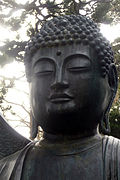Early life and education
Hilbert was born in New Jersey in 1947 and grew up in Florida. A high school drop out, he enlisted in the Army in 1964 [2] at age 17. [3] In 1966, he was assigned to Company A, 35th Infantry Division, 3rd Brigade Task Force in Vietnam. On May 29, 1966, his company was taken by helicopter to an ongoing battle at LZ 10 Alpha near Pleiku Province, Vietnam as part of Operation Paul Revere. [3] During the fighting Hilbert was shot in the head, resulting in an 8-square-inch hole in his skull. [2] He also was hit in the back with shrapnel. Due to combat, he could not be airlifted out until the following morning. [3]
Hilbert was taken to a field hospital, where bullet fragments were removed from his brain. [4] The wounds left him paralyzed on his left side. [4] After rehabilitation, he recovered the use of most of his leg and some functioning of his arm. [4]
He obtained his bachelor's degree (multidisciplinary) from Coker College, and then attended Case Western Reserve University to study social work, obtaining both his master's and PhD. Hilbert is also an artist. [5] After his release from the Army, Hilbert dedicated himself to working with those suffering from combat-related post-traumatic stress disorder, or PTSD.
Trauma victim work
After college, Hilbert began a private practice focused on helping trauma survivors, [7] which continued for nearly three decades. A key component of his treatment was the use of contemplative practices with his clients. [7] In addition to his private practice he also served as a consultant to other PTSD treatment facilities.
Eventually his business grew into the Proact Corporation, a canopy organization, which consisted of Rainbeau Research and Counseling Centers, Professional Guidance Institute, Employee Assistance Program, and Stress Intervention Centers. The companies served patients from seven offices in two states.
Hilbert twice testified before the U.S. Congress as an expert witness on those suffering from PTSD. [1]
Zen
At 19, he began meditating and studying Zen. [7] and eventually became a student of Ken Hogaku Shozen McGuire roshi at the Dharma Mountain Zendo in Cloudcroft, New Mexico. In 2005, he was given Dharma Transmission. [8]
In 2005, he retired from clinical practice to establish the Order of Clear Mind Zen in Las Cruces, New Mexico, with affiliates in northern California, Virginia, and West Texas. Hilbert has a history of street practice, [9] [10] bearing witness for peace, and continues his community service with vulnerable populations. [11]
This page is based on this
Wikipedia article Text is available under the
CC BY-SA 4.0 license; additional terms may apply.
Images, videos and audio are available under their respective licenses.


